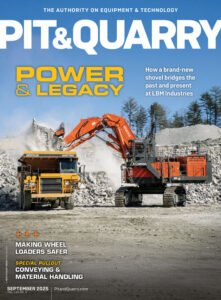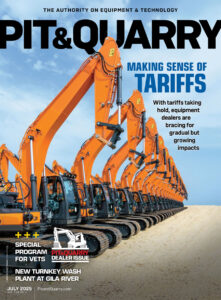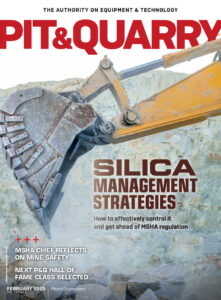Author
Budgeting for profits
Budgets are almost essential for every business and can help aggregate producers plan for a prosperous future. Successful aggregate producers usually develop budgets to monitor progress toward their goals, help control spending and predict cash flow and profit. In other words, budgets are an operator’s plan of action for his or her business. Not only are budgets a plan of action for the aggregates business, they are a tool for evaluating performance at the end of specific time periods. At its most basic, a budget is a systematic method of allocating financial, physical and human resources in order to achieve strategic goals. Developing a budget Many operators begin in business with a mine or a property lease, basic equipment, machinery, a line of credit and the best intentions. Initially, most do contemplate the financial needs of their operation. Too often, however, the financial needs are not given all the attention they deserve – especially as things start to slide downhill. Far too many operators honestly believe things will work out,… Keep Reading
Mergers & Acquisitions: Bargain hunting
Some recent mergers and acquisitions of major aggregate producers may have smaller producers thinking. Surprisingly in today’s uneven and uncertain economic climate, two recent reports show that mergers and acquisitions (M&A) are on the upswing, with most of the action involving smaller deals (and a couple very large ones in Martin Marietta Materials’ purchase of Texas Industries and the Lafarge/Holcim union). Obviously, not every aggregate producer is in a position to buy, but weak earnings and declining market share create great buying opportunities for good managers. For many small sand, gravel and crushed-stone business owners/operators, mergers are a way of cutting overhead costs, increasing efficiency, battling a larger competitor or acquiring a permit. M&As are often based on the belief that a profitable, better-managed business can get more out of the assets of an underperforming business than was possible under its current ownership. Admittedly, most small aggregates businesses tend to grow “organically,” that is by slowly adding customers, employees, new services or products, equipment and physical space. Others grow by… Keep Reading
Estimates can be taxing
Consider these tips for reducing the frustration of the estimated taxes process. It should come as no surprise that Uncle Sam wants taxes paid in full during the course of the year. Avoiding the penalties associated with guessing wrong about estimated tax payments is easy: Anyone, including any sand or gravel business, large or small, can usually avoid penalties by basing its estimated tax payments on its previous year’s tax bill. But if the coming year turns out to be a bad one financially, basing estimated tax payments on the previous year can mean the government, not the business, gets to use those funds — interest-free — for as long as a year. If the coming year turns out to be a good one, basing estimated tax payments on the previous year may mean no penalty, but a whopping tax bill when the tax return is filed — along with the first estimated tax installment for the upcoming tax year. Estimating the income and the tax bill of any aggregates… Keep Reading
Profiting from trade shows
Learn what can and cannot be tax deductible when you attend or exhibit at an event such as ConExpo-Con/Agg. Every owner, manager and employee of a stone, sand or gravel business has long been allowed to claim an income tax deduction for the expenses of attending trade shows, conventions and meetings. Thanks to our tax laws, the government will pick up the tab for a sizable portion of the expenses of attending those events – if the rules are followed. Because our tax rules allow a deduction for all of the ordinary and necessary expenses paid or incurred in carrying on a trade or business, every aggregates producer can deduct the travel expenses of attending a convention if it can be shown that attendance benefits the business. The agenda does not have to deal specifically with anyone’s official duties and responsibilities; it is enough if the agenda shows attendance was for bona fide business purposes. Business vs. personal While all travel expenses can be deducted if the trip is entirely… Keep Reading
A sure thing
A little year-end tax planning can lead to certain tax savings for aggregate producers. Year-end tax planning can be quite simple: merely accelerate tax-deductible expense payments before the end of the tax year to reduce taxable income. To be really effective not only for the current tax year, but for years down the road, there is obviously more to it than that. However, now is the best time to begin thinking about, and planning for, a reduced tax bill for your aggregate operation’s tax bill. The best guarantee of consistently low tax bills is tax planning. Tax planning is easy: the more tax deductions taken, the lower the crushed stone, sand and gravel producer’s taxable income will be – at least for the current tax year. Or, perhaps, ignoring potential tax deductions this year might mean significant savings in later years when profits – and tax bills – are higher. But how do you make the moves necessary for lower tax bills before the end of the tax year and… Keep Reading
Affordable Care Act
Don’t overlook tax credits and other employer sweeteners that were created as part of the Affordable Care Act. Lawmakers are attempting to repeal it, businesses are suing to prevent its implementation, and local governments and unions continue their efforts to be exempted from the massive, and controversial, “Affordable Care Act” (ACA) – the healthcare reforms enacted in 2010. More recently, President Barack Obama’s administration announced it is postponing for a full year, until 2015, the Act’s “Employer Mandate,” the requirement that employers with more than 50 workers provide health insurance to their employees or face stiff penalties. Unfortunately, while everyone seems to be experiencing difficulties with the ACA, many within the aggregates mining industry appear to be overlooking tax credits and other sweeteners for employers that were created as part of the ACA and are already in effect. Small business health tax credit The Internal Revenue Service is encouraging small businesses to explore and, if qualified, claim a unique health insurance coverage tax credit. The credit was created for eligible… Keep Reading










